Unboxing the Nike Air Pegasus Plus felt just like unexpectedly running into a long-lost friend. But let’s find out if it’s really the running shoe we’re all jonesing for in this review.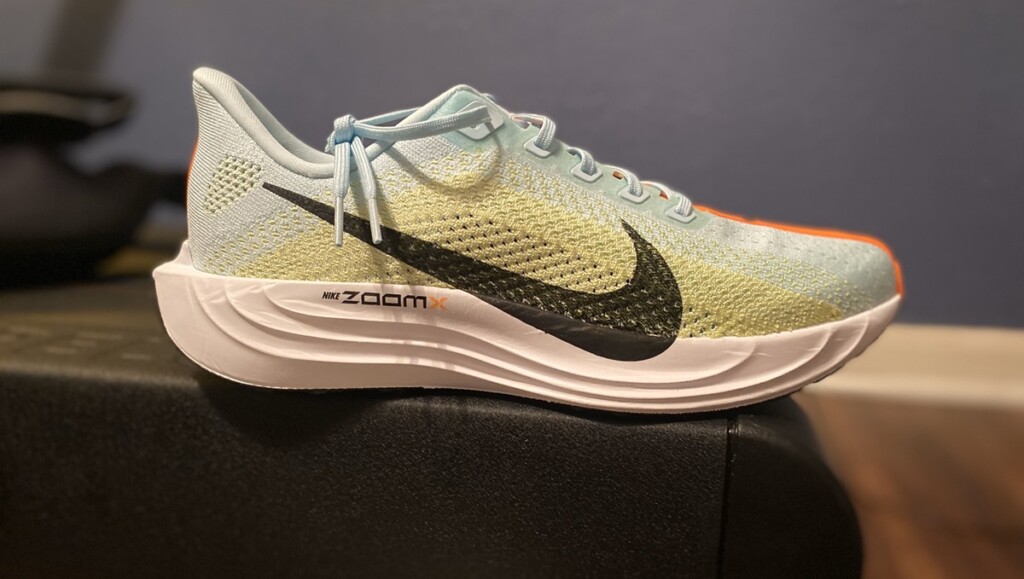 For those of us who have fast and fond history with this shoe’s still shockingly discontinued older siblings, the Air Pegasus Zoom Turbo (v1 & 2), the mere sight of this shoe will inspire all the wistful feels and have you itching to slip them on and see how they measure up to their predecessors.
For those of us who have fast and fond history with this shoe’s still shockingly discontinued older siblings, the Air Pegasus Zoom Turbo (v1 & 2), the mere sight of this shoe will inspire all the wistful feels and have you itching to slip them on and see how they measure up to their predecessors.
(Notice how I didn’t mention the ‘tweener disaster that was the Air Zoom Pegasus Turbo Next Nature…yeah…I still don’t want to talk about those.)
But is the Pegasus Plus anything more than a run down Memory Lane?
Who is it Good For?
Who is the Nike Pegsaus Plus a good fit for, let’s break it down by some common categories:
- Wide Feet: Nike generally is not ideal for wide feet
- Heavier Runners: Better than the original Pegasus for cushion, but less stability
- Long Runs: Will work well for marathon training for most runners, unless you like higher cushion
- Front of the Pack: Faster runners will enjoy these for easy runs to quick workouts as a non-plated option
Coach Amanda surprised herself by falling in love with the lower stack and less cushion of the Pegasus 41…but now might be thinking that the Plus should be in her rotation instead. It’s hard to pick between good shoes.
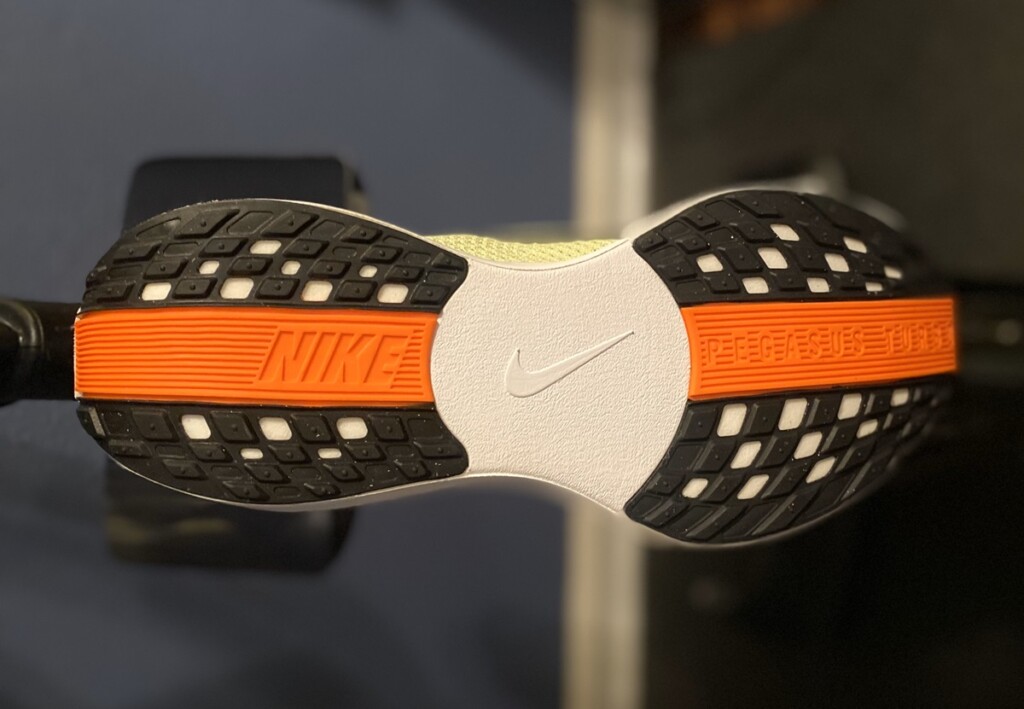
Nike Pegasus Plus Specs
Let’s dive in with some of the top line info that we all need to know about a shoe! This is not a max cushion shoe and yet it’s also not quite as firm as the Pegasus, so…a moderate cushion?
The Pegasus Plus is a great lighter weight option that doesn’t have the bulk of a max shoe and can serve a runner for a variety of runs. If you liked the Nike Turbo, this is going to be a favorite.
- Neutral shoe
- Moderate cushion
- Weight: 8.6 oz men’s, 7.2 oz women’s
- Heel drop: 10 mm
- 8 colors men, 6 women
- Not available in wide
- Available now on Nike.com ($179) Or Available at RunningWarehouse.com
Pegasus Plus Overview
Nike bills this shoe as its new do-it-all super trainer, complete with ZoomX Foam (more on that later), and a Flyknit upper, promising a smooth, fast ride.
Like its legendary daily trainer counterpart, the Air Pegasus, the Pegasus Plus does not have a plate included in the sole, which is a throwback choice that will undoubtedly speak to long-time runners.
Super trainers are a new breed of shoe designed to be the level down from your super shoes (aka your carbon plate top tier marathon race day shoes). The idea is with a good blend of foam, you should find the shoes feel fast and your legs feel fresher thanks to that ever increasing amount of foam.
But it’s fairly unusual to find a super trainer without a plate, even if it were only a nylon plate. And I wonder if that’s part of what left us wanting more from this shoe, the expectation of what that title holds.
Let’s talk about the look.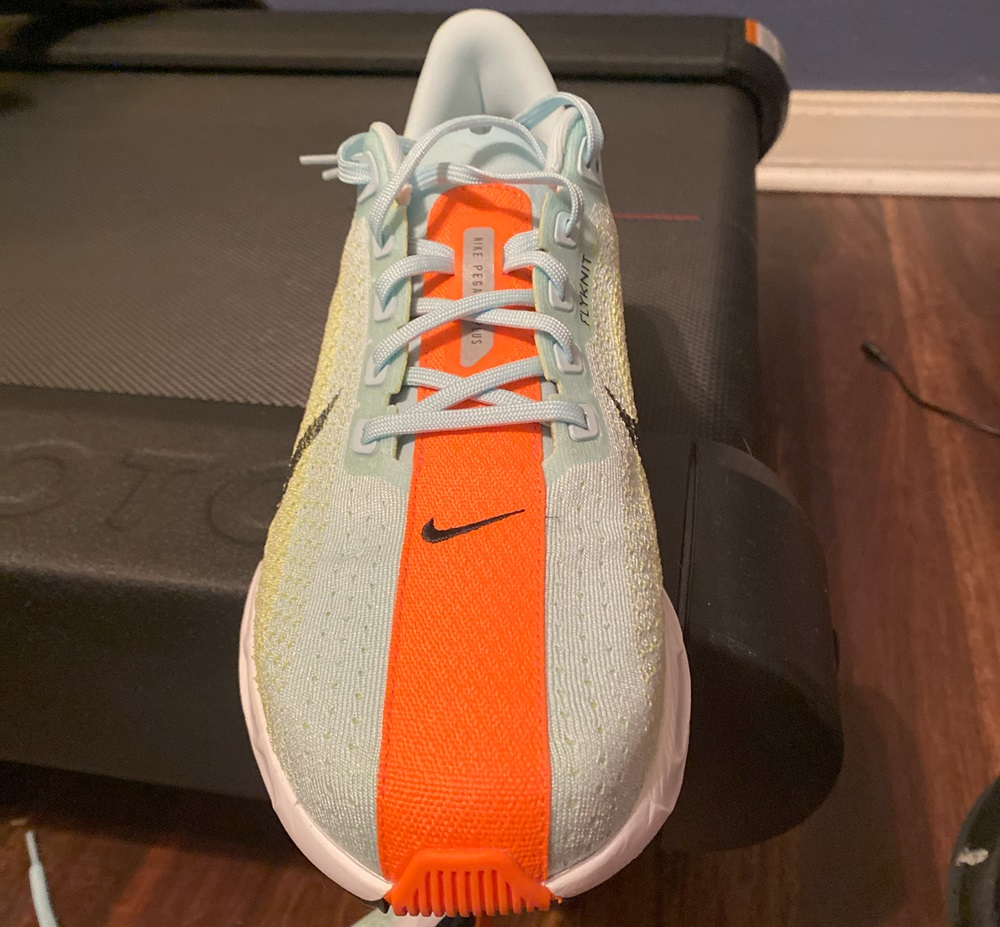
Vibrant colors and a design eerily similar to the Air Pegasus Zoom Turbo is going to bait and hook a lot of Nike loyalists.
The shoe looks fun and fast, two of my favorite “f”words.
Several members of my run group peppered me with questions about the shoes as I sported the Pegasus Plus on multiple long runs.
Chef’s kiss. Seriously.
I logged around 70 miles in the shoe, mostly on the roads, but did manage to sprinkle in some track and treadmill work to provide you all with a thorough and honest assessment of the shoe.
My goodness I had a blast testing this shoe! While it did feel a little like the upper needed a few runs to break in, that’s fairly unusual. Most shoes are ready to right out of the box, so something to consider if you’re buying them right before a race or maybe not using them on a long run right out of the box.
Nike Pegasus Plus Fit
As is the case with most Nike shoes, this model runs true to size and their shoes are more narrow than other brands. It’s not an ideal fit for most of our wide foot runners….though again we often find the Pegasus to be a little more forgiving than other models.
Expect a very snug ride in the Pegasus Plus. We’ve heard some struggle with the mid-foot, but actually had a different experience.
The tongue is thin and runs evenly between the laces, not veering to the side as in other Nike Models (Alphafly & Vaporfly).
But you feel locked in with the upper and in the heel.
The perforated Flyknit is highly breathable and held up well during a few steamy long runs. (Anyone else happy Fall is here?)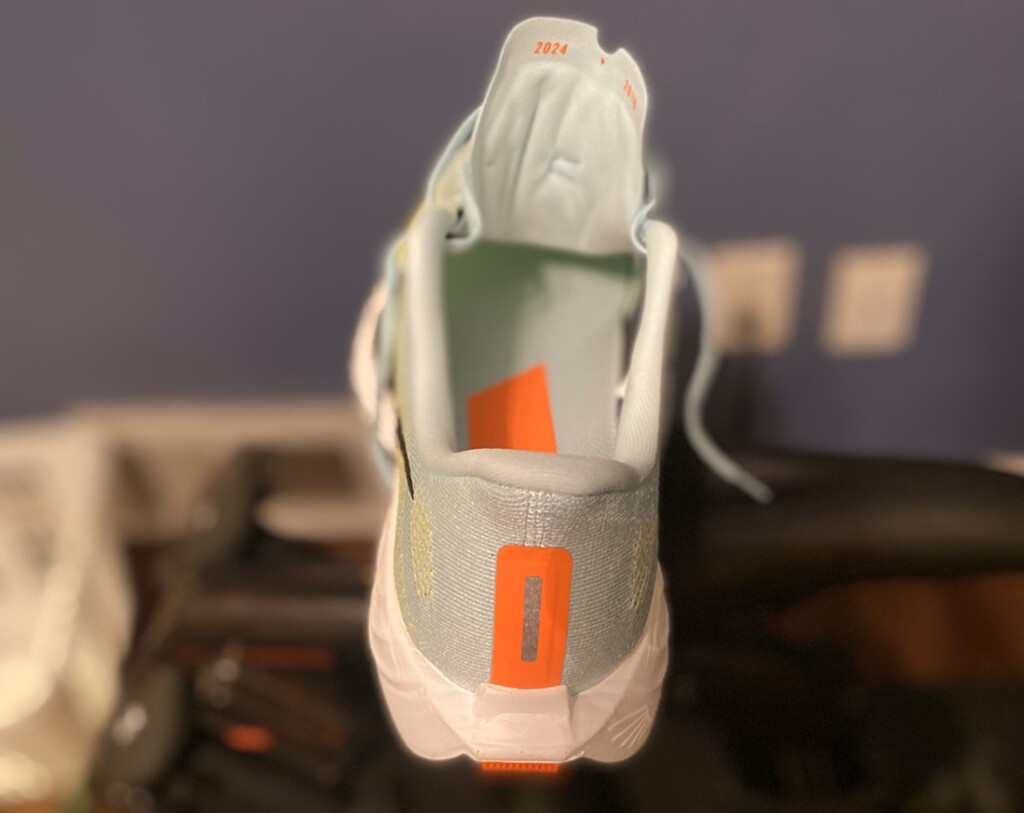
The Foam
ZoomX Foam comprises the entire midsole of the Pegasus Plus
It’s soft, light, and designed to increase speed via energy return.
This is an upgrade from the foam blend in the original Pegasus Air Zoom Turbo, as well as recycled foam from the much maligned Pegasus Turbo Next Nature.
Nike Pegasus Plus Feel
We’ll get into the specs shortly, but the biggest shortcoming of the Pegasus Plus is the shoe’s feel.
It performs well in casual miles and transitions smoothly from relaxed efforts into faster paces. If you are running at a casual pace you could easily dial up the speed and intensity significantly and the shoe responds seamlessly.
However, the Pegasus Plus’ feel is significantly firmer than the majority of its super trainer counterparts.
For me, this became increasingly glaring during the final miles of a recent long run, which is when we all need our shoes to perform.
At times Pegasus Plus felt a bit stiff and unresponsive, which is atypical for a shoe in this price range.
Nike went to great lengths to mirror the design of the Pegasus Turbo, but missed the mark on replicating the magical, bouncy feel of the shoe that distinguished it as the first outstanding super trainer.
Of course, super trainers have changed considerably in the last five years, but Nike also opted to exclude any plating in this shoe, which is now an expectation in trainers at this price point.
One final note on the feel of the shoe is that the rubber outsole is a little suspect in wet conditions, so please be mindful if you are wearing the shoe in the rain!
We want you all to run safe and injury free. *knocks on wood while crossing fingers*
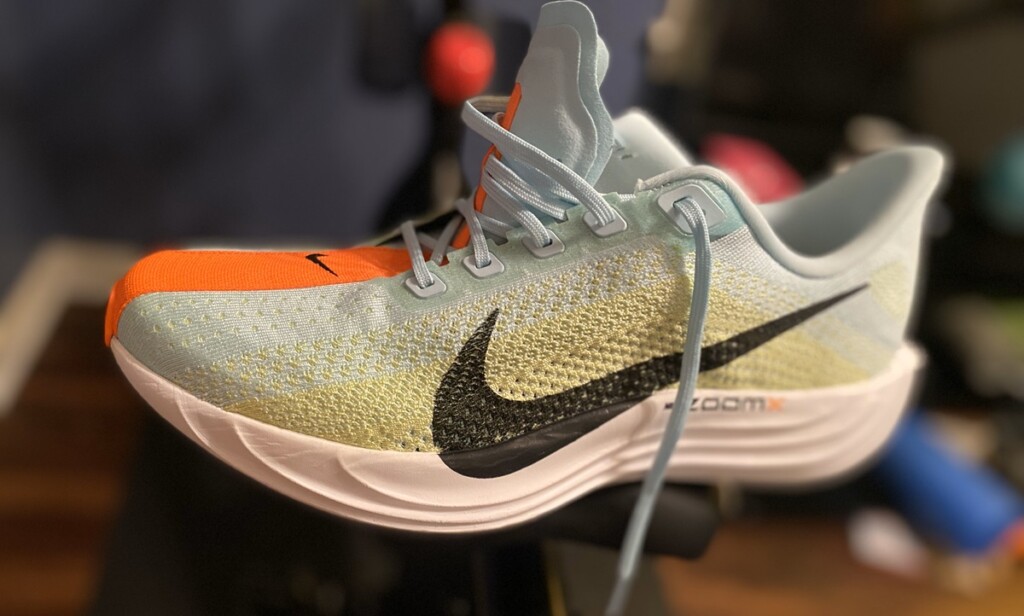
Our Verdict
We wanted to love this shoe, but the Pegasus Plus just feels a bit stiff and unresponsive, which is atypical for a shoe in this price range. Available now on Nike.com for $179
Similar Shoes to Nike Pegasus Plus
All right whether you have a brand you love already or you’re just trying to get a feel for this shoe, here are some similar recommendations:
- Brooks Hyperion Max 2 – maybe a tad more cushion
- Puma Deviate Nitro 3 – added nylon plate feels faster
- Hoka Mach 6 – better to accommodate wider feet
Nike Pegasus 41 VS Pegasus Plus: Same-Same or Very Different?
The Air Pegasus is one of Nike’s longest-produced and most beloved running shoes of all time.
Overall the Plus is going to be lighter, have a higher stack height with a little softer feel and have that slightly higher premium shoe price tag.
A number of folks have decided it’s a better daily trainer option than the original. We’re on the fence because it really depends on how you feel with the extra cushion. Some folks will find the Pegasus feels more reactive and faster than the Plus, which is the nature of adding cushion without a plate.
The Pegasus 41 (As in, they have made 40 other iterations of the shoe) is incredibly popular.
- Price $140
- Weight: 10oz
- Shoe Type: Daily Trainer
- Best suited for short to middle-distance runs
- Feel: Firm
- Cushioning: Medium
- We really like this as a go to daily trainer option for those not seeking max cushion.
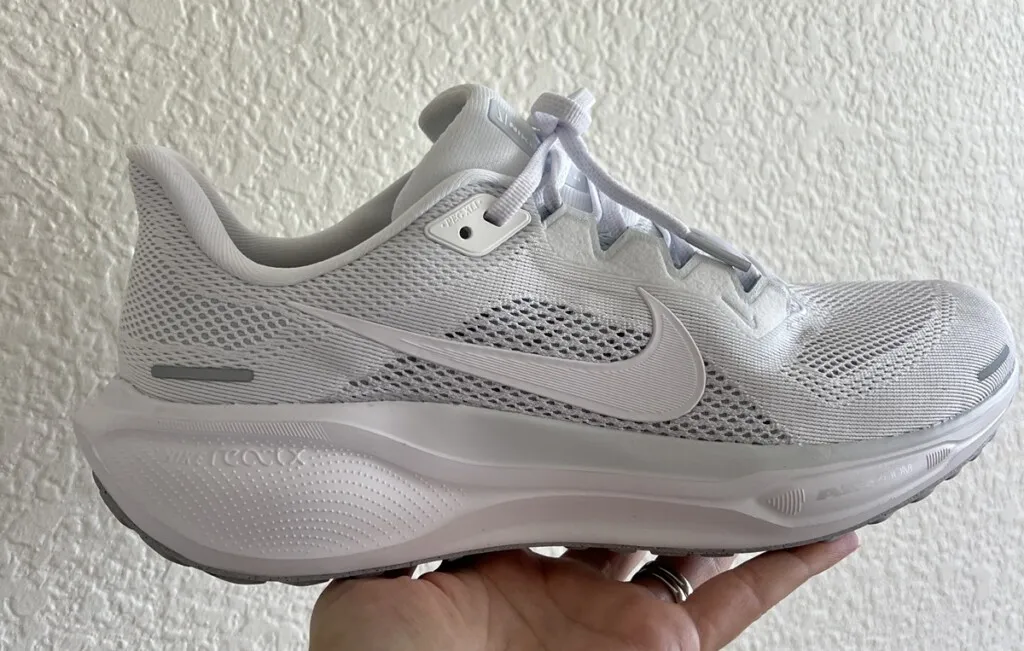
Quick Refresher on the Pegasus Plus
- Price: $180
- Weight: 8.6 oz
- Shoe Type: Daily Trainer
- Versatile
- Can short to long distance runs
- Feel: Firm, but more energy return than the Pegasus 41
- Cushioning Medium
Ruling (Get Your Gavel Ready)
- With running shoes, I always abide by the “If it’s not broken, why fix it?” mentality. If you’re happy in the OG Pegasus, it may not be worth the price jump to try something different.
- But, if you love the Pegasus and are thinking of changing up your training (i.e. adding distance, speed, etc.) it might be a chance to add a new shoe to your repertoire!
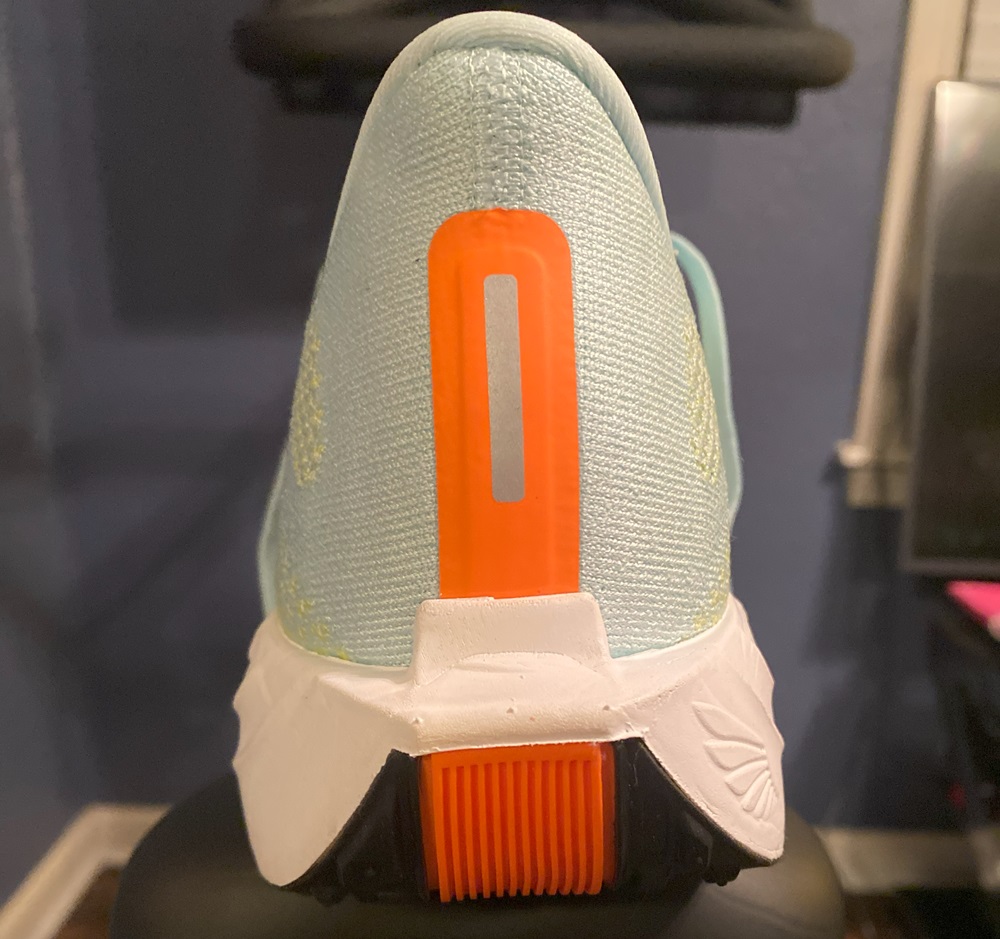
Who Will Like the Pegasus Plus?
Having a wide repertoire of shoes isn’t practical or desired for all runners, and the Pegasus Plus is here for those looking for a reliable, everyday trainer.
The eye-catching design is a plus (wink-wink) and the shoe is versatile enough to handle a variety of runs.
- You are looking for a “can do it all” type of trainer
- You prefer a steady, firm ride that’s a bit more traditional
- You are a fan of the ever-reliable Nike Pegasus and are looking for a bit more from your trainer
- You are willing to sacrifice a bit of comfort for a lighter shoe.
Who Will Not Like the Pegasus Plus?
- Runners with wider feet
- Our friends farther back in the pack who need more cushion in their trainers
- High mileage runners accustomed to modern super trainers such as the Hoka Mach X2 or Saucony Endorphin Speed
- Air Pegasus Zoom Turbo loyalists
What We Went Through (By “We,” I mean me and the shoes, obviously)
I wanted to discover how the Pegasus Plus performed across a spectrum of efforts.
- Casual Runs (aka Easy on the Effort Scale)
- Fartleks (Speed Pickups)
- Long Runs (X2, 16 miles, 20 miles) (Endurance Efforts)
- Interval Work (Both Track and Treadmill Work) (Moderate to Hard Efforts)
The shoe performed strongly every time I laced them up.
But the overall feel of the shoe could prove to be a key factor when deciding if the Pegasus Plus is for you!
There it is! Our Nike Pegasus Plus Review.
We would love to hear from you. If you have run in this or other Nike shoe, feel free to drop a comment below. It all helps other runners who are trying to decide what shoe they’ll try next!



 Best Running Sports Bras: Support, Chafe Free, Stylish Running
Best Running Sports Bras: Support, Chafe Free, Stylish Running